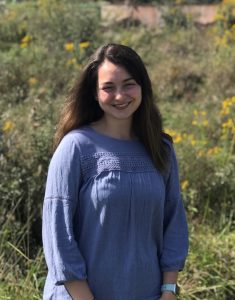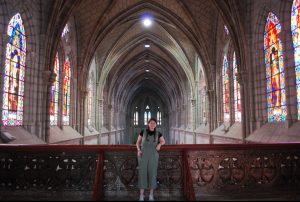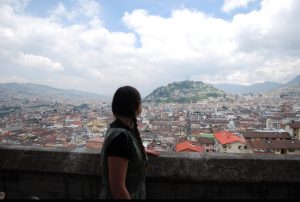May
31
The Everlasting Effects of Ecuador
Filed Under From the Field, US-Latin American Relations - Ecuador! | Leave a Comment

Colleen Quinn is a recent alumna who studied Politics and International Relations, as well as French
(What is From the Field? Click here to read the intro for this latest segment to our student blog series!)
Reflecting on my time in Ecuador is like reopening a favorite book or having a conversation with a friend that you haven’t seen in forever. We were only there for a week, but that time was so rich, each day filled with learning, little adventures, and memories that can only happen when you fully commit to living in the moment. Myself and the other students that embarked on this trip are forever changed by the people we met and everything we learned. I saw a volcano. I met a man who is working to preserve his community and educate visitors on indigenous culture. I delighted in the little joys throughout the days and let the views (and the elevation) take my breath away. I ate so many incredible dishes that I have attempted to recreate without notable success. My only conclusion is that I am just going to have to return to Ecuador in the near future so I can really remember what everything tasted like and re-experience the wonder of a country that is so full of beauty, be it the creation or the people. All of the unforgettable experiences I lived made my ELI goals quite relevant, because they were focused in two areas, communication with the groups we interacted with and cultural learning.
Communication is an integral aspect of a relationship, so I wanted to be able to communicate with the people we met in Ecuador to form meaningful relationships with them. This element became one of my goals because I plan to work in a profession where I interact with other cultures. With that in mind, I thought our short term stay in Ecuador could be an opportunity to seek to understand languages and cultures of the people with whom I hope to interact, and to test if I could be responsive in an unfamiliar language. In order to do this, I needed to be able to speak Spanish, the official language of the country. I wanted to learn some common phrases and sayings so I could attempt to converse with the locals, especially since the sites we visited were not common for tourists, and therefore, many of the Ecuadorians spoke very little English. To achieve this goal, I attended the Messiah University Spanish club meetings and watched and listened to Spanish videos and music. In Ecuador, I planned to use a few common words and sayings that I picked up on to listen and hopefully be able to respond to our hosts.
When we arrived in Ecuador, I committed myself to absorbing as much Spanish as possible because I really wanted to be able to talk to everyone we met. This proved to be somewhat overwhelming, because there was Spanish everywhere. By the end of our first day there, I had a headache from trying to remember all of the phrases I learned and all of the signs with Spanish that I had seen. I began taking photos and videos of street signs and billboards so I could remember what they said later, a habit which a few people in our group found to be a bit odd. I told them I wanted to take everything in and be able to remember it all, and because I do still have all the photos of the random billboards or street signs, I remember what they all mean!
While my endeavors with signs were fairly successful, I quickly realized that I was woefully underprepared to communicate with the locals in Spanish. Every time I started a conversation with someone we met, I quickly switched from Spanish to French (a language with which I am much more familiar), which garnered quite a few confused looks and an occasional “que?” from my conversation partners. In one attempt to make a connection, I accidentally told a tour guide that I was the mother of five children. I am not. Definitely not my best moment! I quickly decided that it would be best if I focused on listening to our hosts, to see how much of the conversation I could understand without a translation. This proved to be a much more attainable goal, and I found that I was able to comprehend about half of what was being said most of the time. Although I ended up focusing more on listening, I am eternally thankful for our host and sometimes translator Israel, and Jackson, another student on my trip, who were both willing to help me ask questions and shared many easy-to-remember phrases with me. Without them, I would have ended up lost somewhere and asking the locals questions in the mixture of Spanish and French that I adopted.
To learn a nation’s culture and community is an incredible gift, something I discovered during my time in Ecuador. For my second goal, I hoped to learn how the indigenous culture is included and respected in the larger Ecuadorian community or what actions are being taken to give the indigenous people a space a part of Ecuador’s culture. My hope with this goal was to gain insight about how other countries are including people who have typically been excluded, and bring that information to the communities of which I am a part in the future.
I had the chance to visit one of the many pueblos indígenas in Ecuador, where our guide, Segundo, showed us his community and shared with us his people’s history and customs. I was inspired by the bravery of the indigenous people in their struggle against the Spanish colonists who attempted to subjugate them. Their strength and courage to resist seemingly hopeless situations has finally convinced the Ecuadorian government to begin the process of giving indigenous peoples rights to their own customs, and protection from industrialization and western modernization. During our tour of Segundo’s community, he introduced to restorative justice, the indigenous way of punishing community members who have committed a crime. He slapped our hands with ortiga, or stinging nettles, to give us the sensation that criminals experience when they are whipped with the plant while completely naked. I can definitely see how this punishment would be an effective deterrent from committing future crimes, since my hand was stinging for the rest of the day. While the government has begun working with the indigenous communities, many of the indigenous and people working alongside them see this as a small beginning and have hopes for a future where the indigenous communities are treated as equals with the citizens of Ecuador.
In creating my goals, I believed I knew what I was walking into in Ecuador. I was surprised to find that my time there was much different than I imagined it would be. The rich depth of culture and community that greeted me upon my entry into Ecuador was better than any experience I could have imagined. I am so thankful for the opportunity that I had to go on this trip, the other students who went with me, and all of the people we met there. Even though I am not fluent in Spanish, I learned to appreciate the gift of being able to communicate and the opportunity I was given to listen, because I learned so much more about the people and culture of Ecuador than I ever imagined. Instead of ‘adios’, I am saying, ‘nos vemos’, or ‘see you soon’, because I know I will be back in Ecuador soon.

